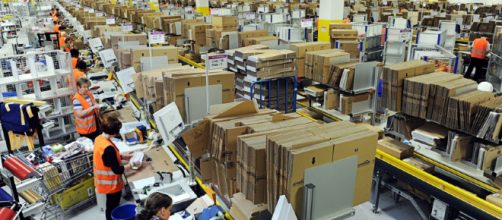Already accused of having a draconian work environment, Amazon has been granted a patent to give their own workers ultrasonic wristbands that will track their every move, and nudge them in the right direction. This new ‘time-saving’ measure, as Amazon calls it, has exploded with controversy.
These wristbands would track Amazon’s employees every move and provide haptic feedback to employees as they work. The proposed wristbands are made to work in tandem with ultrasonic units arranged throughout the factory floor. The ultrasonic tracking feature would be used to identify the precise location of a worker’s hands as they retrieve a product on one of many inventory bins on shelves, pack it into a delivery box, and send it on its way.
The wristbands would also use a haptic feedback system able to vibrate to nudge the employees in a different direction.
The wristbands have been criticized for providing the higher-ups at Amazon a new way of surveilling their workforce, and strictly reinforce their workers to not waste any time.
Jeff Bezos’ monstrous company Amazon first filed a patent for ultrasonic wristbands in 2016 but was only granted the patent last week. The company is clearly considering the measure, but it has not yet provided a timeline to when the devices will go into the arms of their employees.
What has Amazon has been saying?
According to the patent filings, Amazon is saying that the current inventory systems already have “time-consuming acts” in place, but they hope to speed up even more with the introduction of the ultrasonic bracelets.
The thought is to, theoretically, decrease employee error by creating a more efficient system.
Amazon told The Verge in an email, “By moving equipment to associates’ wrists, we could free up their hands from scanners and their eyes from computer screens.”
Why is Amazon especially prone to the controversy?
As criticized by The Guardian, Amazon already has a bad reputation of turning its low-paid staff into “human robots.” The company has previously been reported to have staffers carry out rigorous, repetitive packaging tasks as fast as possible in order to hit the high goals set by handheld computers. The Verge also accused of intolerable conditions in Amazon warehouses, with timed toilet breaks, 55-hour work weeks, and packing timers.
The Guardian also wrote about a BBC investigation that found how agency workers in the delivery sectors reported defecating in bags, or speeding or falling asleep on roads as they tried to reach the ambitious delivery goals set by the company.
The company has recently been going through many methods of expansion, including a self-checkout go app. Amazon is also opening up a second headquarters, and the fight over which city will get the right is far from over.


